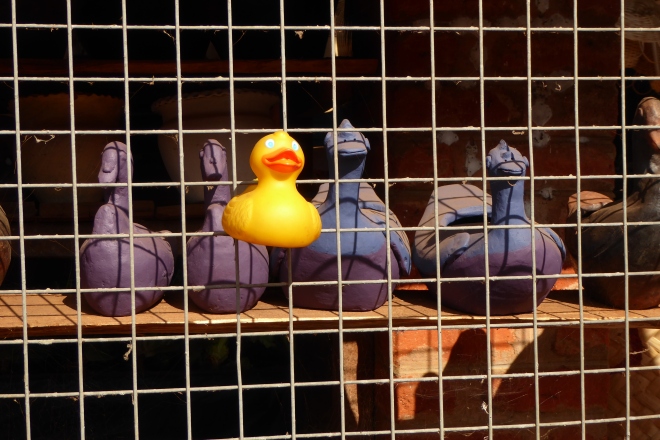This morning as we prepare to leave Lilongwe, the capital of Malawi, our group of six women is forever split. Two women will climb Mount Mulanje in southern Malawi. Mom and I, Zeb the Duck, and 3 other women begin a trip with Kiboko Safari Company.
Today we will ride to the Zomba Plateau. Tomorrow we will hike and camp here. Then we will visit Liwonde National Park for a safari. We will also spend a day and night camping at Cape Maclear. After a visit at Chongoni Rock Art, we will return to Lilongwe and this group of women will all leave Malawi to resume separate lives. Today I want you to see every day scenes of Malawi, from our vehicle. Fire wood provides heat and fire to cook and heat water. This is one way wood is moved across Malawi.
These bikers carry so much wood. That requires much work, balance and talent. We are riding toward some of Malawi’s mountains.
If people are able to acquire a bike, they can travel faster and further than those that only walk. I really like this tall mountain.
Of course, living in Colorado, I always appreciate mountain scenery. We saw several carts like this one.
Many people use transportation that is not powered by machinery. Looking through the window, we were captivated by the markets and all the activity on both side of the road.
This road is on the border of Malawi and Mozambique. The right side is Mozambique and the left side is Malawi. Mozambique borders Malawi on much of the east, all of the south and some of the west. This truck, like most motorized vehicles, carries much cargo and many people.
Along the side of the road, we often saw these white bags.
This is charcoal. Most charcoal is produced illegally in Malawi. The production of charcoal leads to more deforestation. Many people understand the problem, but still keep some charcoal to burn during power outages. We stopped in the town of Zomba. Zomba was founded in 1891 as the capital of the British Central African Protectorate. Zomba remained the capital until 1975, about 10 years after independence. In 1975 Lilongwe became the capital of Malawi, but Zomba is still very important. This girl demonstrates that the females learn to balance and carry heavy loads on their heads at a very young age.
This is a big load of firewood. We walked through the market and I posed for this photo with some distant Malawian relatives.
Even though I am not in many of these photos today, I, Zeb the Duck, was there looking out the window with the humans. We passed some markets along the road.
There is a lot of straw products in this part of Malawi. We saw many houses of this style.
Some houses, like this one, had goats.
Remember the goats are important for their milk. Milk is consumed by humans and sometimes made into goat cheese. Excess milk and cheese can be sold, also. The goat is eaten when it no longer produces baby goats and no longer gives much milk. Previously I showed you scenes from near Lake Malawi. Today we are viewing a mountainous area of Malawi. We love the many geographic regions of Malawi and hope you do, also.













